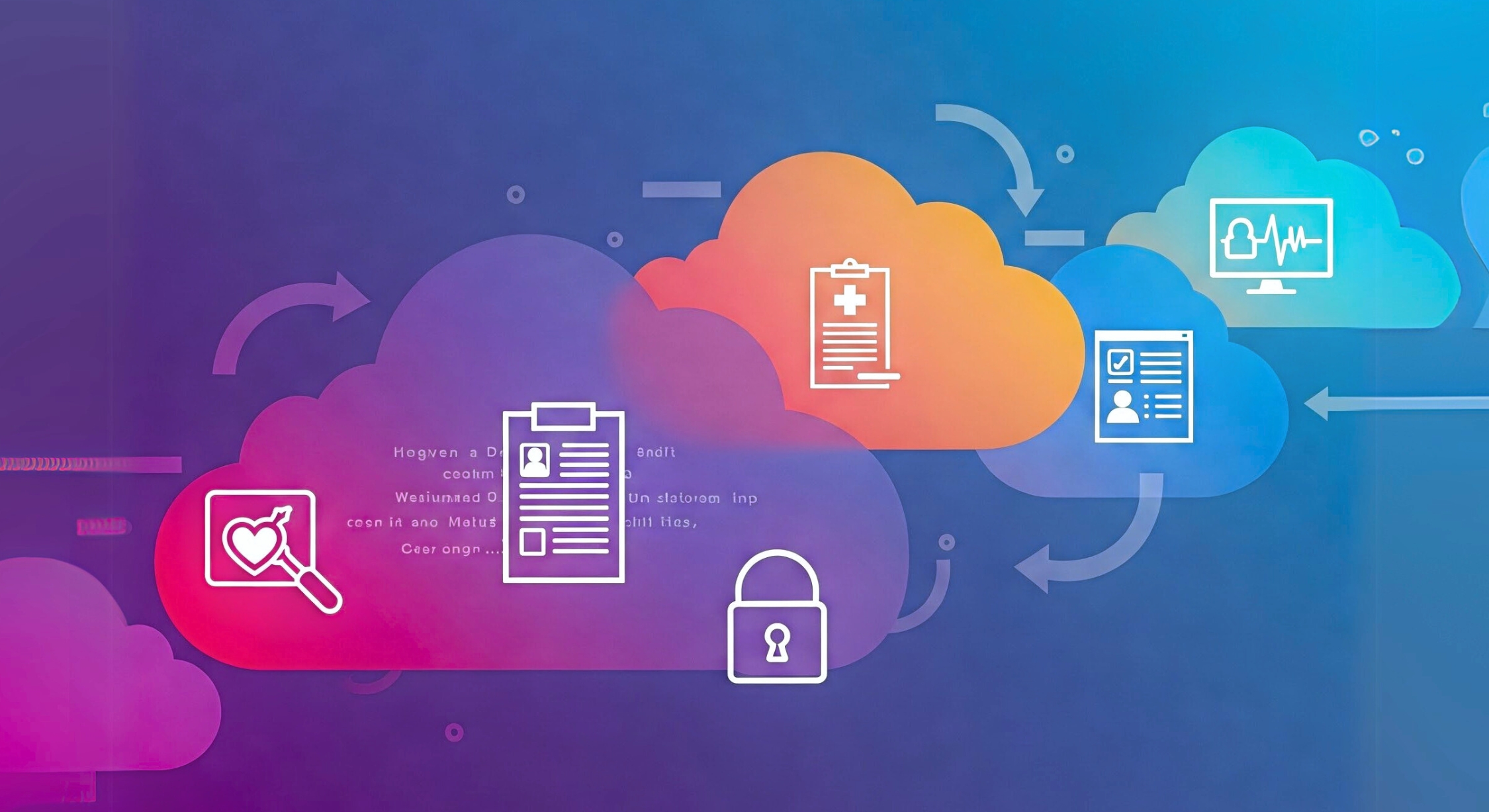At Experion Technologies, we blend cutting-edge technology with domain expertise to design cloud solutions for healthcare that improve operational efficiency, enhance patient care, and ensure regulatory compliance.
Digital technologies are redefining the way healthcare is delivered, signalling a major shift in the industry’s landscape. Among them, cloud solutions for healthcare have emerged as a transformative force, empowering healthcare providers with scalable infrastructure, real-time data access, and intelligent analytics. The integration of cloud-based solutions is revolutionizing healthcare delivery, optimizing operations, and ultimately improving patient outcomes.
Key Benefits of Adopting Cloud Solutions

Cloud computing is reshaping the healthcare landscape by offering intelligent, scalable, and patient-centric technology platforms. For providers navigating digital transformation, the adoption of cloud solutions for healthcare is no longer a matter of ‘if’, it’s a matter of ‘when.’ Here’s a deep dive into how these solutions are revolutionizing healthcare delivery and operational excellence:
- Scalability and Cost-Effectiveness
One of the most compelling reasons for adopting cloud based solutions is the ability to scale resources dynamically based on organizational needs. Whether it’s handling patient surges during seasonal outbreaks or expanding services across geographies, cloud platforms can easily scale without the capital expenditure of traditional infrastructure.
- Healthcare organizations avoid upfront costs for hardware.
- Pay-as-you-go models offer financial flexibility.
- IT teams can allocate resources more strategically.
This economic model makes cloud computing especially attractive for smaller hospitals, clinics, and startups pursuing digital health innovations.
- Interoperability Across Systems and Locations
Cloud solutions for healthcare play a critical role in connecting disparate systems, electronic health records, diagnostic labs, imaging centers, pharmacies, and billing departments.
- Integrated cloud ecosystems support standardized APIs and data formats.
- Enable seamless communication between legacy systems and new platforms.
- Improve multidisciplinary collaboration and cross-site care delivery.
Ultimately, this interoperability enhances clinical decision-making and supports value-based care initiatives.
- Anywhere, Anytime Data Accessibility
With cloud based healthcare solutions, medical professionals are no longer tethered to on-site systems. Doctors and nurses can securely access patient records, imaging data, or prescriptions from any device whether during a home visit, at a different facility, or even in transit.
- Improves the speed and quality of emergency care delivery.
- Enables telemedicine and remote patient monitoring.
- Reduces administrative friction by digitizing manual tasks.
Such accessibility is essential for modern healthcare ecosystems that prioritize mobility, flexibility, and responsiveness.
- Real-Time Insights and Predictive Analytics
The cloud is not just about data storage it’s about harnessing data intelligently. By integrating AI and machine learning into cloud platforms, healthcare providers gain access to:
- Predictive models for early disease detection.
- Population health management dashboards.
- Automated alerts for high-risk patients or medication adherence.
These cloud based solutions turn raw data into actionable insights, helping clinicians make more informed, timely decisions.
- Built-In Disaster Recovery and Business Continuity
Hospitals and clinics cannot afford downtime especially during critical procedures or pandemics. Cloud infrastructure ensures high availability, automated backups, and rapid recovery in case of:
- Natural disasters (e.g., floods, earthquakes).
- Hardware failures.
- Cybersecurity incidents like ransomware.
Business continuity features are embedded into many custom cloud solutions, making them resilient and reliable even under pressure.
Types of Cloud Deployment in Healthcare
Choosing the right deployment model is crucial to optimizing cloud solutions for healthcare. Factors such as data sensitivity, compliance requirements, and organizational goals influence this decision. Below is an in-depth overview of the three principal cloud deployment models commonly applied in healthcare:
- Public Cloud
A public cloud is hosted and managed by third-party service providers like AWS, Microsoft Azure, or Google Cloud. It runs on a shared infrastructure, allowing multiple organizations to utilize the same hardware and services.
Advantages:
- Fast and easy to deploy.
- Cost-efficient, with minimal IT maintenance overhead.
- Ideal for non-sensitive workloads like appointment scheduling apps or health education portals.
Use Cases in Healthcare:
- Hosting mobile health apps.
- Running cloud-based CRM systems.
- Storing anonymized research datasets for public health analytics.
Despite its affordability, public cloud usage in healthcare is often limited to less sensitive data due to concerns over privacy and control.
- Private Cloud
A private cloud is exclusively used by a single healthcare organization. It may be hosted on-site or by a third-party provider but remains dedicated to one client.
Advantages:
- Enhanced control over infrastructure and data.
- Customized security policies designed to comply with HIPAA, GDPR, and other regulatory standards.
- Greater customization and performance optimization.
Use Cases in Healthcare:
- Storing and managing EHRs.
- Operating imaging and diagnostic tools that require fast processing.
- Handling sensitive billing and claims data.
Custom cloud solutions often start with a private cloud setup, particularly in large hospital networks and academic medical centers.
- Hybrid Cloud
The hybrid cloud model seamlessly integrates public and private cloud environments, enabling data and applications to shift between them based on evolving needs.
Advantages:
- Get the best of both worlds — the cost efficiency of the public cloud with the security of a private cloud.
- Flexibility in choosing where to store specific workloads.
- Supports gradual cloud migration and legacy system integration.
Use Cases in Healthcare:
- Keeping patient data and diagnostic tools in a private cloud while using a public cloud for analytics and reporting.
- Running telemedicine apps on a public cloud while protecting session recordings in a secure private environment.
This model is ideal for organizations seeking agility while remaining compliant with complex healthcare regulations.
Compliance and Regulatory Considerations
When adopting cloud solutions for healthcare, maintaining compliance with global and regional regulations is not optional, it’s mandatory. Given the highly sensitive nature of patient data, regulatory compliance serves as the foundation for building secure, ethical, and legally sound healthcare IT systems. Let’s take a closer look at the key compliance standards that cloud service providers and healthcare organizations must uphold:
- HIPAA (Health Insurance Portability and Accountability Act) – United States
HIPAA is the cornerstone of healthcare data protection in the U.S., specifically concerning Protected Health Information (PHI). Any cloud service provider working with U.S. healthcare entities must ensure:
- End-to-end encryption of patient data in transit and at rest.
- Access control mechanisms to limit data exposure.
- Audit trails and logging to track data access and modifications.
- Business Associate Agreements (BAA) between healthcare providers and cloud vendors.
Failure to comply with HIPAA can result in steep penalties and reputational damage, making it essential for all cloud solutions in healthcare to be built on HIPAA-compliant infrastructure.
- GDPR (General Data Protection Regulation) – European Union
For healthcare organizations operating in or handling data from the EU, GDPR compliance is crucial. Unlike HIPAA, which is sector-specific, GDPR applies across industries but has strong implications for healthcare due to the sensitivity of medical records.
- Patients have the right to access, rectify, and delete their personal data.
- Organizations are required to secure clear and informed consent before handling any personal health information.
- Data breach notifications must be issued within 72 hours of discovery.
- Data must be stored with appropriate technical and organizational security measures.
Cloud-based healthcare solutions serving EU citizens must be designed with data minimization, accountability, and transparency in mind.
- HITRUST CSF (Common Security Framework)
HITRUST is a widely recognized certifiable framework that harmonizes several standards (HIPAA, ISO, NIST) into one comprehensive security and privacy certification.
- Often seen as a gold standard in healthcare IT.
- Helps organizations streamline compliance and security processes.
- Offers increased trust to clients and patients using cloud platforms.
Many custom cloud solutions for healthcare seek HITRUST certification as a signal of commitment to protecting patient data.
- ISO/IEC 27001 – Global Standard for Information Security Management
ISO 27001 is a global benchmark for information security management systems (ISMS). It’s not healthcare-specific but extremely relevant when evaluating the robustness of cloud-based solutions.
- Focuses on risk management, continual improvement, and documentation.
- Ensures that cloud providers have a structured security approach.
- Aligns with other frameworks and is often required for international operations.
Why Compliance Matters for Cloud Solutions in Healthcare
- Patient Trust: Compliance reassures patients that their data is safe and used ethically.
- Risk Mitigation: Reduces exposure to lawsuits, fines, and regulatory scrutiny.
- Business Continuity: Helps maintain uninterrupted services through strong governance.
- Global Operability: Ensures smooth cross-border data exchange and system integrations.
By designing with compliance at the core, cloud solutions for healthcare not only meet legal mandates but also elevate the overall integrity and efficiency of healthcare delivery systems.
Understanding Cloud Solutions for Healthcare

A cloud solution for healthcare is a technology framework that leverages cloud computing to host, manage, and deliver healthcare applications and services. Unlike traditional, on-premise IT systems, cloud solutions provide enhanced flexibility, scalability, and connectivity—traits that are increasingly vital in today’s patient-centered and data-driven care environments.
Let’s explore the key components that define a robust healthcare cloud architecture:
- Cloud Storage for EHRs, Imaging, and Diagnostic Reports
At the heart of most cloud platforms in healthcare is secure cloud storage, which houses critical clinical data such as:
- Electronic Health Records (EHRs)
- MRI and CT scan images
- Lab test results and pathology slides
- Clinical notes and prescriptions
Cloud storage enables:
- Real-time access to patient data across departments and facilities.
- Disaster recovery, minimizing downtime and data loss.
- Cost reduction, eliminating physical storage and maintenance overhead.
This centralization improves care coordination and makes it easier to track patient histories comprehensively.
- Cloud-Based Platforms for Scheduling, Patient Engagement, and Communication
Modern cloud based solutions go beyond data storage. They encompass platforms that enhance operational workflows and patient experiences:
- Scheduling and appointment management tools accessible via patient portals.
- Two-way communication systems for teleconsultations, reminders, and follow-ups.
- Mobile apps for remote monitoring, chronic care management, and lifestyle coaching.
These platforms empower patients to become more active participants in their care while reducing administrative burdens on healthcare staff.
- Middleware and APIs for Interoperability
Healthcare systems frequently function in isolation, relying on a mix of outdated and disparate legacy software. To create a unified ecosystem, cloud solutions rely on middleware and APIs (Application Programming Interfaces):
- Enable integration with legacy hospital systems, lab systems, and pharmacy databases.
- Facilitate real-time data exchange between different care settings.
- Support FHIR (Fast Healthcare Interoperability Resources) standards for universal data compatibility.
This level of interoperability is essential for ensuring continuity of care, especially in multi-specialty or multi-location networks.
- Security Protocols and Data Protection Mechanisms
Given the high-value nature of healthcare data, cloud infrastructure must be built on a security-first architecture. This includes:
- Encryption of data in transit and at rest using advanced cryptographic standards.
- Role-based access control (RBAC) to limit data access based on user permissions.
- Multi-factor authentication (MFA) for verifying authorized personnel.
- Audit logs and activity monitoring to track every data interaction.
Together, these components ensure compliance with data privacy laws while reinforcing organizational accountability.
Key Cloud-Based Solutions Used in Healthcare

Here are the most widely adopted cloud based solutions in the healthcare sector:
- Electronic Health Records (EHR) and Cloud Storage
Cloud-hosted EHR systems allow healthcare providers to securely store and retrieve patient data in real time. They enable:
- Centralized patient records accessible across departments.
- Reduced errors and redundant tests.
- Improved patient outcomes due to coordinated care.
- Telemedicine Platforms
Telehealth adoption surged post-pandemic. Cloud-based telemedicine tools allow virtual consultations, appointment scheduling, remote diagnostics, and follow-ups. Benefits include:
- Accessibility for patients in remote or underserved regions.
- Reduced hospital readmission rates.
- Improved convenience and patient satisfaction.
- AI-Driven Diagnostics and Predictive Analytics
With cloud infrastructure, machine learning models are capable of assisting in:
- Detecting anomalies in radiology and pathology scans.
- Forecasting patient risks based on historical data.
- Optimizing treatment plans and resource allocation.
- Enhanced Collaboration Among Providers
Cloud-based platforms foster communication between primary care providers, specialists, pharmacists, and patients. Real-time collaboration enables:
- Faster diagnoses.
- Fewer errors due to miscommunication.
- Improved patient engagement.
Custom Cloud Solutions for Healthcare: Tailoring Technology to Unique Needs
Not all healthcare organizations are the same nor should their cloud solutions be. That’s where custom cloud solutions come in.
From large hospital networks to niche clinics and health-tech startups, each entity has specific workflows, compliance needs, and patient engagement models. A standardized, one-size-fits-all approach often falls short in addressing the unique challenges and goals of individual healthcare providers. Custom cloud solutions for healthcare allow organizations to adopt a flexible, purpose-built approach that aligns perfectly with their operational structure and long-term vision.
Customization allows:
- Tailored dashboards and analytics that provide real-time, role-specific insights to clinicians, administrators, and leadership teams. These dashboards can highlight critical KPIs, population health metrics, or clinical outcomes based on each department’s goals.
- Integration with legacy EHR systems, ensuring that existing investments in technology are not rendered obsolete. Custom solutions enable smooth interoperability between old and new systems using APIs, middleware, and secure data migration methodseliminating data silos and improving workflow continuity.
- Personalized patient experiences through intuitive, mobile-friendly interfaces, virtual care modules, and engagement tools. These solutions allow for individual customization, such as language preferences, chronic condition management tools, AI chat support, and self-service options enhancing satisfaction and long-term patient retention.
- Workflow automation aligned with clinical protocols, helping to streamline routine administrative tasks like billing, appointment scheduling, claims processing, and even AI-assisted diagnostics. This reduces manual errors, accelerates service delivery, and frees up valuable time for care providers.
At Experion, we understand the importance of custom cloud solutions and work closely with healthcare providers to build platforms that address their unique needs, whether it’s a cloud-native telemedicine app that serves remote populations or an AI-enhanced diagnostics platform tailored for specialized treatment centers.
Security and Compliance Challenges in Healthcare Cloud Adoption
Data Privacy and Cybersecurity Threats
The healthcare sector remains one of the most frequently targeted industries for cyberattacks. Cloud adoption must be backed by robust security measures, including:
- End-to-end encryption.
- Multi-factor authentication.
- Intrusion detection systems.
Best Practices for Securing Patient Data
- Regular audits and vulnerability assessments.
- Role-based access control (RBAC).
- Incident response plans and real-time monitoring.
Ensuring Compliance with Healthcare Regulations
Cloud providers must support compliance by offering:
- Encryption at rest and in transit.
- Data residency options.
- Third-party certifications (e.g., SOC 2, HITRUST).
- Detailed audit logs and customizable access policies.
Future of Cloud Solutions for Healthcare

The future of cloud solutions for healthcare is bright, dynamic, and deeply intertwined with emerging digital technologies. As healthcare continues to shift from reactive care to proactive, preventive, and personalized care models, cloud-based solutions will serve as the backbone for innovation, scalability, and intelligence. Here’s a glimpse into how upcoming breakthroughs will redefine the healthcare landscape:
- Edge Computing
Edge computing brings data processing closer to the source whether that’s a bedside monitor, a wearable device, or a diagnostic tool. This decentralization of computing power reduces dependency on centralized servers, minimizing latency and enhancing speed.
- In critical care scenarios, milliseconds matter. Edge-enabled cloud systems ensure real-time insights that can trigger alerts or interventions without delay.
- Enables real-time analytics at the point of care, such as detecting arrhythmias from a wearable ECG or alerting staff to sudden drops in oxygen levels.
- Improves performance in remote and low-connectivity areas by reducing the need for continuous internet access.
Combined with cloud infrastructure, edge computing ensures that healthcare data is both immediate and intelligent, enhancing clinical responsiveness.
- AI Integration
Artificial Intelligence is becoming a powerful companion in healthcare delivery, and its integration into cloud platforms will only deepen over time. With the vast data storage and compute capabilities of the cloud, AI can be embedded seamlessly into day-to-day workflows.
Cloud solutions of the future will enable:
- Personalized medicine through AI-driven treatment plans based on a patient’s genetic profile, lifestyle, and medical history.
- Smart resource scheduling, optimizing the allocation of staff, beds, operating rooms, and equipment using predictive algorithms.
- Predictive maintenance of medical equipment, reducing downtime and ensuring that devices such as MRI machines and ventilators are always functioning optimally.
By uniting cloud scalability with AI’s learning capabilities, custom cloud solutions will support a level of clinical intelligence that’s both proactive and precision-focused.
- Internet of Things (IoT) in Healthcare
IoT devices are revolutionizing the healthcare landscape, providing constant streams of real-time data. From smart beds that track patient movement to wearable monitors that capture heart rate, glucose levels, or oxygen saturation these devices generate massive datasets.
- Cloud platforms are essential for ingesting, processing, and analyzing this continuous influx of data.
- Enable predictive modeling to anticipate health deterioration or disease progression.
- Support care continuity by providing clinicians with a unified dashboard of patient vitals and behaviors, whether in a hospital, at home, or in transit.
IoT-enabled cloud ecosystems promote a connected care environment that enhances outcomes and lowers healthcare costs.
- Remote Patient Monitoring (RPM)
Cloud-enabled RPM platforms are redefining the landscape of chronic disease management and preventive healthcare. With aging populations and the rise of lifestyle-related diseases, continuous monitoring is becoming a key strategy for long-term management.
- Patients with conditions like diabetes, hypertension, or heart failure can be monitored 24/7, reducing the need for frequent hospital visits.
- Alerts can be generated for anomalies, enabling timely intervention and preventing hospitalizations.
- Health data from RPM devices can be visualized on cloud dashboards and integrated with EHRs to maintain a holistic patient record.
This transformation supports value-based care models, improves patient adherence, and fosters stronger patient-provider relationships through proactive engagement.
- Predictions for the Next Decade
The fusion of AI, IoT, blockchain, and cloud computing is set to transform the boundaries of what’s achievable in healthcare. Here are some of the visionary advancements we can expect:
- Full-scale AI Hospitals: Future hospitals may operate with cloud-based decision engines that orchestrate everything from diagnostics to discharge. AI will analyze patient data in real-time to recommend treatments, flag risks, and allocate resources automatically.
- Blockchain-Integrated Cloud Systems: Blockchain will be used alongside the cloud to create tamper-proof, decentralized patient records. This will enhance trust, enable patient-controlled data sharing, and streamline consent management for research or second opinions.
- Smart Cities with Unified Health Monitoring: Imagine city-wide health monitoring systems that use cloud-enabled IoT infrastructure to track community health trends, predict disease outbreaks, and support emergency response systems. This vision will turn population health management into a real-time, data-driven service.
In essence, the future of cloud solutions for healthcare lies not just in digital transformation but in intelligent evolution. As these technologies converge, healthcare will become more predictive, preventive, personalized, and participatory ultimately placing patient well-being at the center of a smarter, more connected ecosystem.
How Experion Can Offer Support in Developing Cloud Solutions for Healthcare
Experion Technologies partners with healthcare providers to design, develop, and implement secure, compliant, and scalable cloud solutions tailored to their unique requirements. Our services include:
- Cloud strategy consulting and migration.
- Custom application development for EHR, telemedicine, and analytics.
- Compliance-first cloud architecture design.
- Ongoing support, monitoring, and optimization.
Our proven expertise in healthcare domain combined with our agile delivery model ensures faster go-to-market and measurable ROI for your cloud investments.
Conclusion
Key Takeaways
- Cloud solutions for healthcare are transforming how care is delivered, managed, and optimized.
- Organizations can choose from public, private, or hybrid cloud deployments based on their needs.
- Compliance with regulations like HIPAA and GDPR is critical to cloud adoption.
- Cloud-based solutions enable scalable, real-time, and intelligent systems like EHR, telehealth, and AI analytics.
- Custom cloud solutions allow organizations to align technology with their specific operational and clinical workflows.
- Security, privacy, and regulatory adherence remain top priorities for healthcare cloud infrastructure.
- Emerging tech like edge computing, IoT, and AI will redefine the healthcare cloud landscape in coming years.
At Experion, we are committed to helping healthcare providers embrace the cloud with confidence. Our deep domain knowledge, regulatory expertise, and innovative approach enable us to create transformative cloud-based healthcare solutions that improve lives.

